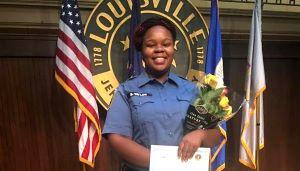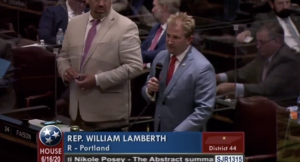No-knock police raids are under fire like never before. Will we finally see change?
Louisiana's medical marijuana program is set to expand, Ohio regulators recommend adding a new qualifying condition for medical marijuana, and more.
A Jacksonville narc has some paperwork problems, an Alabama prison guard heads for federal prison, and more.
Pot decriminalization bills are popping up in New Jersey, hemp is now legal in the Commonwealth of the Northern Marianas Islands, Rio's drug gangs get busy with coronavirus, and more.
Louisiana's governor signs a medical marijuana expansion bill into law, Colorado's legislature passes a bill giving the governor the ability expunge past small-time marijuana convictions, and more.
The Pennsylvania Supreme Court clarifies that state officials can't order drug tests as part of child welfare investigations, Senate Republicans roll out their version of a police reform bill, and more.
In the mass protests over out-of-control and racially biased law enforcement ignited by the killing of George Floyd by Minneapolis police office Derek Chauvin, Floyd's name isn't the only one being chanted by the crowds. There's also Ahmaud Arbery, the Georgia jogger gunned down by white vigilantes. There's Rayshard Brooks, the Atlanta man shot and killed by police after falling asleep in his car in the Wendy's drive-through lane and them tussling with and fleeing from them as he sought to avoid arrest.
And then there's Breonna Taylor. The 26-year-old black EMT and Louisville resident was killed on March 13 as police executing a midnight no-knock drug search warrant at her apartment were greeted by gunfire by her boyfriend.. As
the circumstances of her death emerged, she has become the face of the burgeoning movement to radically restrict the police resort to no-knock warrants, which could just as aptly be referred to as home invasion warrants.
That's what it felt like to Ms. Taylor and her boyfriend Kenneth Walker. Although Louisville police claimed they knocked and announced their presence, they were operating with a no-knock warrant, and that account is disputed by Walker and Taylor's relatives. Walker said he and Taylor were in bed together when the door crashed in and he thought someone was breaking into their home. He said he fired in self-defense. (Here is that fraught zone where the war on drugs encounters the 2nd Amendment.)
Walker's single shot wounded one officer, who returned fire along with two other officers. Breonna Taylor was hit by at least eight bullets and died at the scene. Walker was charged with attempted murder, although those charges have now been dropped. No drugs were found at the apartment. To make matters even worse, the drug suspect the police were looking for was already in custody when the raid went down.
"They executed this innocent woman because they botched the search warrant execution," attorney Benjamin Crump, who is representing the Taylor family in a lawsuit filed over the killing told the New York Times. "They had the main person that they were trying to get in their custody, so why use a battering ram to bust her door down and then go in there and execute her?"
Outrage over the killing of Breonna Taylor quietly festered as the country hunkered down amidst the coronavirus pandemic, but when the iconic killing of George Floyd finally galvanized the streets, the pain and anger over Taylor's killing became a rallying cry not just in Louisville but across the land. And it's bringing a laser-like focus on a practice more akin to raiding terrorist hideouts in the Middle East than to serving and protecting American citizens, which in turn is leading to a renewed focus on the role of the drug war in all of this.
The war on drugs provided the impetus for no-knock raids from the beginning, and the courts were all too willing to help. The 1963 US Supreme Court case Ker v. California, which gave constitutional imprimatur to forcible police entries, was a drug case where the possibility that evidence could be destroyed carried the day for the cops. When the Supreme Court revisited and refined its no-knock doctrine in the 1990s, the impetus once again was enforcing drug prohibition.
In a case involving small-scale sales of marijuana and meth to an informant, the court ruled in 1995 in Wilson v. Arkansas that police must generally "knock and announce" before kicking in a door with a search warrant, although it allowed for exceptions as per Ker. In another small-time drug sales case, 1997's Richard v. Wisconsin, the court held that police needed to demonstrate "a reasonable suspicion" that announcing their presence before bashing in the door would be dangerous or allow for the destruction of evidence for a no-knock warrant to be permitted.

Breonna Taylor was shot and killed by Louisville police in a fatally bungled no-knock drug raid in March. (Family photo)
Those rulings left "reasonable suspicion" up to state and local judges, and while little national or even state data exists on the rates at which judges rejected no-knock warrant requests, a pair of local studies suggests they essentially acted as rubber stamps. A recent
PBS Newshour report cited a Denver Post analysis of no-knock warrant requests from Denver police in 2000, a year after Mexican citizen
Ismael Mena was killed in a no-knock drug raid. The cops got 158 out of 163 requests approved. Similarly, a Washington Post analysis of no-knock warrant requests by policy in Little Rock, Arkansas, between 2016 and 208 had the cops getting 103 out of 105 approved.
Police resort to no-knock raids has gone through the roof in recent decades, according to a 2007 study done by Peter Kraska, a professor with the School of Justice Studies at Eastern Kentucky University. He found that while no-knock or announce and enter raids happened about 1,500 times in the early 1980s, that figure skyrocketed to about 40,000 a year by the turn of the century as the drug war deepened. Kraska estimated the number of such raids at about 45,000 a year by 2010.
The raids are mainly for drugs. A 2014 ACLU report looking at SWAT teams doing no-knock raids found that 62% of them were for drugs. In at least a third of those raids, no drugs were found. In nearly another third of those raids, it's not known if any drugs were seized because police did not report that information.
And they can be deadly -- both for their targets and for the officers undertaking them. The New York Times reported three years ago that between 2010 and 2016 alone, at least 13 police officers lost their lives on such raids, but so did more than seven times as many civilians. The Times put the civilian death toll at 94, with many hundreds more injured. They include such total innocents as 19-month-old "Baby Bou Bou" Bounkam Phonesavanh, who was severely burned by a flash bang grenade thrown by a Georgia SWAT officer in a 2015 no-knock raid.
But now, with the killing of Breonna Taylor in the context of mass mobilizations against police brutality and racial bias, no-knock raids are being challenged like never before. The Democratic congressional response to the upheaval in the streets, the Justice in Policing Act, directly targets no-knock raids. As the Democrats put it, the bill "[b]ans no-knock warrants in drug cases at the federal level and conditions law enforcement funding for state and local governments banning no-knock warrants at the local and state level." (Advocates are calling for amendments to strengthen the bill -- and then passage.)
Kentucky's libertarian-leaning US Senator Rand Paul (R) met with Taylor's family and then introduced the Breonna Taylor Act "to prohibit no-knock warrants." The bill would mandate that federal law enforcement officers must announce their presence and purpose before executing a search warrant and it would condition federal aid to law enforcement agencies to ensure they follow the same rules.
"After talking with Breonna Taylor's family, I've come to the conclusion that it's long past time to get rid of no-knock warrants. This bill will effectively end no-knock raids in the United States," said Paul.
Meanwhile, even Paul's Republican colleagues are climbing on the no no-knock bandwagon, although to a more limited degree than the Democrats. The just introduced Justice Act, largely crafted by the GOP's sole black senator, Tim Scott of South Carolina, wouldn't ban no-knock raids, but would increase federal reporting requirements for no-knock raids and use of force. It would also increase penalties for false police reports.
It's unclear whether any of these bills will pass or whether compromise legislation will emerge, and it's unclear just how strong any language on no-knock raids will end up being. But what is clear is that Congress finally has the issue squarely in its sights.
But law enforcement is largely a state and local matter, and it's going to be up to state legislatures and governors and city councils and mayors to address the issue at the local level. Louisville has already done so. With protests raging in the streets, the city council early this month moved unanimously to ban no-knock raids. Only two states -- Florida and Oregon -- have banned no-knock raids, but that should be about to change, given the tumult in the streets over police misconduct. It should have happened a long time ago.
back to top
Louisiana's medical marijuana program is set to expand, Ohio regulators recommend adding a new qualifying condition for medical marijuana, and more.
LouisianaLouisiana Governor Signs Medical Marijuana Expansion Bill. Gov. John Bel Edwards on Monday signed into law House Bill 819, which broadly expands the state's medical marijuana program. Now, doctors will be able to recommend medical marijuana for any patient they think it will help.
Nebraska
Nebraska Medical Marijuana Initiative Campaign Still Seeking Signatures. Backers of a medical marijuana initiative say they have some 60,000 valid voter signatures, but that's only half the total they need to qualify for the ballot. Nearly 50,000 of those signatures were gathered before lockdowns imposed because of the coronavirus, which brought signature-gathering to a near halt for months. Now, the campaign has less than a month to gather another 60,000 valid voter signatures.
Ohio
Ohio Regulators Recommend One New Qualifying Condition, Reject Two Others. A state medical board committee has recommended adding cachexia, or wasting syndrome, to the state's list of qualifying conditions for medical marijuana. The committee rejected adding autism and anxiety, though. The board will finalize the decision during a board meeting next month.
back to top
A Jacksonville narc has some paperwork problems, an Alabama prison guard heads for federal prison, and more. Let's get to it:
In Jacksonville, Florida,
a Jacksonville sheriff's detective was arrested last Thursday for falsely filling out forms that document cash, narcotics, or other seized property. Narcotics Detective Bryan Burnett is charged with falsifying documents and official misconduct. At least two forms were falsified, with the amount of money involved under $200. Authorities said the falsifications were not done for monetary gain or Burnett would have been charged with theft.
In York, Pennsylvania, a York County prison guard was arrested Tuesday for plotting to smuggle suboxone into the York County Prison. Officer Joshua Martinez, 31, went down after authorities were informed that he would be getting the drug from an inmate's girlfriend and surveilled him picking up a package from her mailbox. He was then pulled over by state troopers, who found 75 suboxone strips and $2,900 cash. Martinez, the inmates, and the inmate's girlfriend are charged with possession with intent to deliver a controlled substance, criminal conspiracy, and contraband. [Ed: Suboxone and methadone in the prisons would be a helpful measure for authorities to take.]
In Mobile, Alabama, a state prison guard was sentenced Tuesday to seven years in federal prison after being convicted of plotting to bring drugs into the Fountain Correctional Facility in Atmore. Guard Wiggins Washington, 52, went down after he agreed to meet with a man he thought was supplying methamphetamine, but who was actually working with authorities, who had been informed about the scheme. Washington pleaded guilty to possess meth with intent to distribute and to carrying a firearm in relation to a drug trafficking charge. That second charge garnered a mandatory minimum five years.
back to top
Pot decriminalization bills are popping up in New Jersey, hemp is now legal in the Commonwealth of the Northern Marianas Islands, Rio's drug gangs get busy with coronavirus, and more.

A Brazilian favela, or slum. In Rio de Janeiro, drug gangs are coordinating the response to coronavirus in the favelas. (CC)
New Jersey Sees Second Marijuana Decriminalization Bill. Last week, a decriminalization bill, S2535, was introduced in the Senate. On Monday, another decriminalization bill, A1897, advanced from the Assembly Community Development and Affairs Committee. The Senate bill would decriminalize the possession of up to a pound of weed, while the Assembly bill only decriminalizes up to 10 grams. The Senate bill has $25 fines; the Assembly bill has fines starting at $150, going to $200 for a second offense, $500 for each following offense.
Medical Marijuana
Ohio Regulators Recommend One New Qualifying Condition, Reject Two Others. A state medical board committee has recommended adding cachexia, or wasting syndrome, to the state's list of qualifying conditions for medical marijuana. The committee rejected adding autism and anxiety, though. The board will finalize the decision during a board meeting next month.
Hemp
Northern Marianas Governor Signs Hemp Bill. Gov. DLG Torres has signed into law a bill legalizing hemp in the US territory. The new law allows the Natural Resources-Division of Agriculture to regulate the hemp industry in the CNMI "consistent with the federal requirements."
Drug Policy
Biden-Sanders Task Force Members Push for Legalizing Marijuana and Other Drug Reforms. Joe Biden may not have yet endorsed marijuana legalization, but members of a criminal justice task force he organized appear to be getting ahead of him. One unnamed member, a former federal prosecutor, says that Biden's proposal to decriminalize marijuana doesn't go far enough and should be replaced with legalization, and another, former Attorney General Eric Holder suggested broader drug decriminalization without actually using the word. He said dealing with drug use should be a public health issue and taken "out of the system" of law enforcement.
International
Rio de Janeiro Drug Gangs Now Pushing Social Distancing, COVID Medications. With the government of rightist authoritarian populist President Jaoa Bolsonaro largely absent and in denial about coronavirus, residents of the favelas of Rio de Janeiro are seeing drug gangs effectively replace the state as responders to the pandemic. They are handing out alcohol, gel, medications, and cash to local residents.
(This article was prepared by StoptheDrugWar.org's 501(c)(4) lobbying nonprofit, the Drug Reform Coordination Network, which also pays the cost of maintaining this website. DRCNet Foundation takes no positions on candidates for public office, in compliance with section 501(c)(3) of the Internal Revenue Code and does not pay for reporting that could be interpreted or misinterpreted as doing so.)
back to top
Louisiana's governor signs a medical marijuana expansion bill into law, Colorado's legislature passes a bill giving the governor the ability to expunge past small-time marijuana convictions, and more.

The kids are alright. (Creative Commons)
Marijuana Legalization Linked to Declining Youth Admissions for Marijuana. A study of "cannabis use disorders" in Colorado and Washington, which was led by researchers from Temple University and published in the journal Drug and Alcohol Dependence, shows that "the rate of adolescent treatment admissions for marijuana use declined significantly, with the mean rate falling nearly in half" between 2008 and 2017 and "the decline in admissions rate was greater in Colorado and Washington compared to [states where recreational marijuana is not legal]."
Colorado Legislature Approves Expungement Bill. With a final Senate vote Monday, the legislature approved House Bill 1424, which gives the state's governor the ability to expunge low-level marijuana convictions from the criminal records of people arrested on those charges before legalization took effect. The bill also includes means of defining social equity applicants in the marijuana industry.
Medical Marijuana
Louisiana Governor Signs Medical Marijuana Expansion Bill. Gov. John Bel Edwards on Monday signed into law House Bill 819, which broadly expands the state's medical marijuana program. Now, doctors will be able to recommend medical marijuana for any patient they think it will help.
International
Irish Council for Civil Liberties Calls for Urgent Drug Policy Review. The group's executive director, Liam Herrick, is calling on the new coalition government to make the human rights of drug users a key part of a call for a Citizens' Assembly to "consider matters relating to drug use." The government missed an opportunity when it failed to decriminalize drug possession last year, he said. "A Citizens' Assembly to consider matters relating to drug use would no doubt hear personal testimonies of how Ireland's current drug policy has impacted upon a person's life and it would hear evidence from expert witnesses. However, to reach a policy that guarantees better social, health and community outcomes, the protection and vindication of the human rights of people who use drugs in Ireland need to form the bedrock of the discussion," he added.
back to top
The Pennsylvania Supreme Court clarifies that state officials can't order drug tests as part of child welfare investigations, Senate Republicans roll out their version of a police reform bill, and more.

Tennessee Rep. William Lamberth (R), who blocked a resolution honoring a murdered black girl because... marijuana.
Marijuana Policy
Sole Tennessee Lawmaker Blocks Resolution to Honor Murdered Teen Over Alleged Marijuana Sale. A resolution honoring the life of 17-year-old black girl Ashanti Posey, who was fatally shot in April, was blocked by a single Republican lawmaker, Rep. William Lamberth, who said he could not support the measure because she had allegedly been involved in a low-level marijuana deal before she was killed. The resolution required unanimous consent and had already passed the state Senate. Lamberth's one-man veto sparked angry cries of "black lives matter" in the chamber, and some lawmakers walked out in protest.
Drug Testing
Pennsylvania Supreme Court Rules State Officials Can't Order Drug Tests as Part of Child Welfare Investigations. In a case involving a Republican district attorney accused of child abuse, the state's highest court has ruled that state officials may not order drug tests as part of a child welfare investigation. The court held unanimously that the state's Child Protective Services Law does not "expressly or implicitly authorize collecting samples of bodily fluids, without consent, for testing." The child welfare agency in Fayette County had been requiring such tests despite the lack of a legal basis for doing so. Now, it has stopped.
Law Enforcement
Seattle City Council Takes Up Bill to End Loitering Charges Related to Drugs, Prostitution. Councilmember Andrew Lewis filed a pair of bills Monday to eliminate the charge of loitering when used to try to enforce drug or prostitution laws. Loitering laws, which emerged as part of the war on drugs in the last century, allow police to arrest people they merely suspected of being drug dealers or prostitutes. The bill has support from some other council members, as well as City Attorney Pete Holmes, who helped draft it. "This is an outdated, and frankly racist policy in our City's municipal code." Councilmember Tammy Morales said. "By repealing this part of the code we are assured that drug offenders and sex workers will be treated humanely and not criminalized." The bills go to a vote at the council's next meeting on Monday.
Law Enforcement
Senate Republicans Unveil Policing Reform Bill. Senate Republicans on Wednesday rolled out their version of a police reform bill, which is called the Justice Act. Democrats in the House last week filed their version of a police reform bill, the Justice in Policing Act of 2020. The Republican bill would discourage but not ban tactics such as no-knock warrants or chokeholds, while the Democrats take a tougher approach. The Democratic plan mandates certain policing practices, while the Republican plan avoids such mandates, instead incentivizing law enforcement agencies to curtail such practices by withholding federal funding for departments that allow them or do no report on them.
back to top






